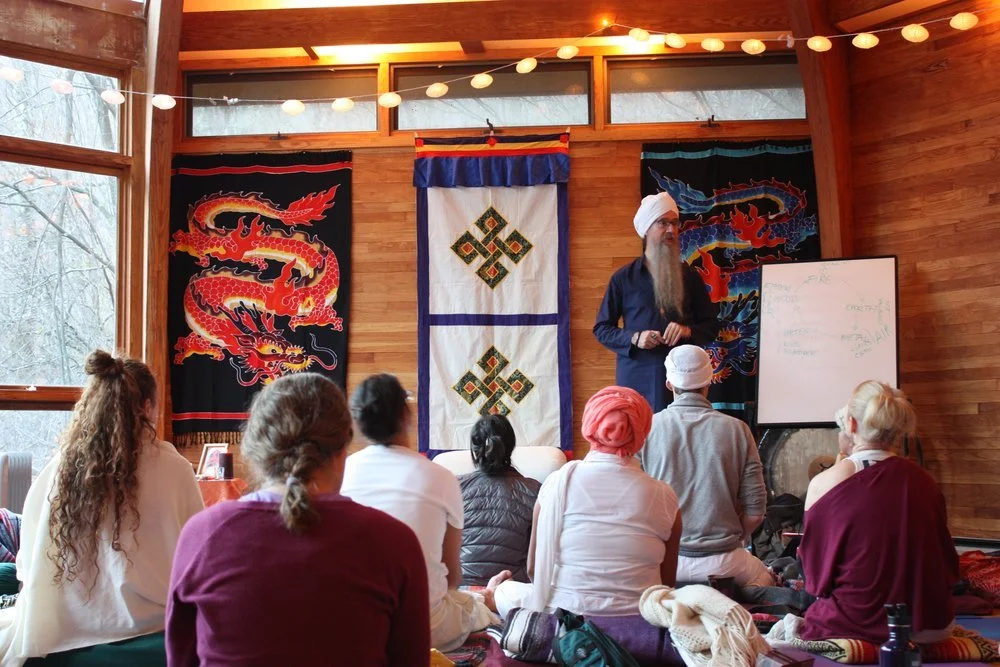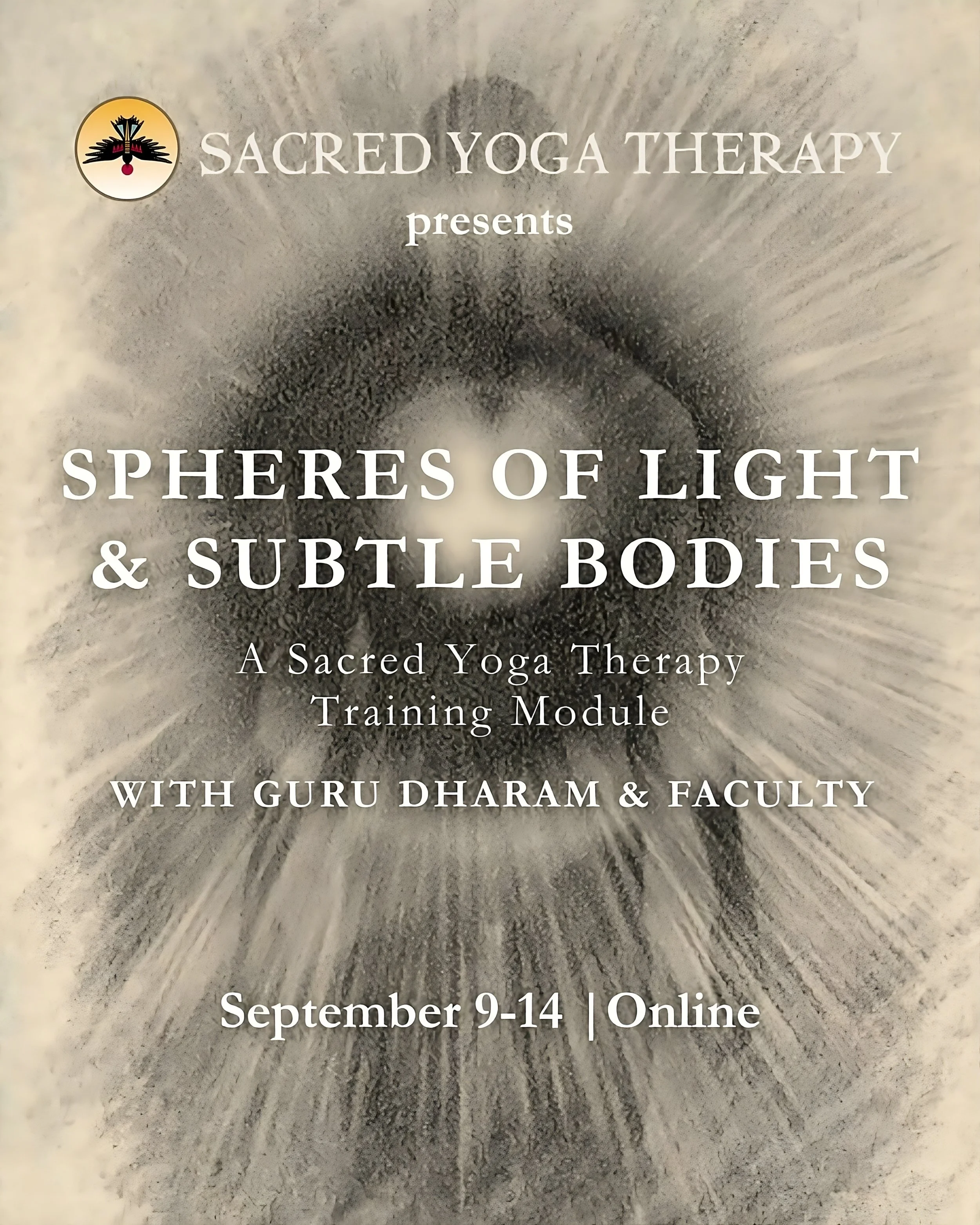Sacred Yoga Therapy
Guided by an exceptional team of teachers, Sacred Yoga Therapy is delivered as intensive modules all comprised of fascinating yogic science, philosophy, information and direct experience. Here the sacred science of Yoga is demystified and deconstructed to give a deeper understanding of how Yoga and Kundalini energy work. Students learn how to apply yoga therapeutically in the one-to-one and small group settings to alleviate distress and suffering and empower the individual on their journey to finding
inner harmony.
Upcoming Training Module
This course is another foundational module in the program. We study several energetic models and frameworks that relate to the elements and subtle anatomy — including the chakra system, the five Koshas in relation to the ten Bodies of Kundalini Yoga, the doshas of Ayurveda, and the Vayus. For each framework, we examine the physiology and psychology in harmony and disharmony. Students learn yoga therapy tools, such as asana, kriya, pranayama and lifestyle guidelines that can be applied within these frameworks. We also learn to analyze kriyas based on these systems. We introduce basic concepts from Ayurveda, approach the basics of 10 bodies numerology and present a brief overview of tongue reading and pulse analysis from both a TCM and Ayurvedic perspective. We work to develop our relationship with Shunia, the sacred space of inner silence.
This module includes:
Asanas and their effect on the Chakras
Chakras, their physiological, emotional and psychological correlates
Kundalini Kriya Analysis
Principles of Ayurveda, the Elements and the Doshas
Psychological and physical profiles of the Doshas
The 10-body model. How they function in health and disharmony
Numerology and 10 bodies model assessment.
Vayus and Koshas
Developing your relationship with Shunia, the sacred space of silence
Sacred Yoga Therapy Module 2:
Spheres of Light & Subtle Bodies
Tuesday 9/9 - Sunday 9/14
8am-4pm EST / 1pm-9pm GMT / 2pm-10pm CET Daily
*with a lunch break and morning and afternoon tea breaks
Happening Online ONLY via Zoom
Full Module (6 Days) $1200
Refresher Rate (For those who have done this course in the past) $550
Day drop-in rate $210
Full Online Cohort
500-hour Sacred Yoga Therapy Training Course: Intermediate Certificate Program
Certified by both Sacred Yoga Therapy/Kundalini Medicine and Yoga Alliance Professionals
June 2025 - May 2026 with completion of course requirements by December 31, 2026
Missed the June start? Begin in September with Spheres of Light (Module 2) and make up Module 1 later in person or online, or when it returns.
800-hour Sacred Yoga Therapy Training Course: Advanced Certificate Program
Certified by Sacred Yoga Therapy and accredited by the International Association of Yoga Therapists (IAYT)
June 2025 - Summer 2027 with completion of course requirements by December 31, 2027
Pricing + Payment options here
In-Person
Copenhagen training
more details coming soon
1-1 Information Meeting
Schedule a complementary 1-1 meeting to discuss the program and whether it is a good fit for you
COURSE DETAILS
Over the course of the modules, we examine the different bio-systems of the human body from a holistic paradigm, presenting them both in health and harmony and in disease and disharmony. The primary focus of the program is learning to work with the mind, emotions and the energy body.
We integrate both western and eastern perspectives in our work. The program covers western anatomy & physiology, psychology, neuroscience and research on yoga and yoga therapy. We also study yogic anatomy and the subtle body in depth, looking at several frameworks and systems for addressing the energetic body and its imbalances. These include the elements, meridians, organs, doshas, chakras, 10 bodies and vayus. Perspectives from Traditional Chinese Medicine and Ayurveda serve to illuminate our understanding of yoga and yoga therapy.
ADVANCING PRACTICE
The extensive course curriculum includes study of the energetic physiology and pathology of, and specific interventions for numerous conditions including stress, burnout, chronic pain, depression, anxiety, addiction, insomnia, life transitions and other common ailments. We learn many tools for helping our clients to find their way back to balance and wellbeing, which are detailed in the following section. The program provides a solid foundation in ethics and self-inquiry as a practitioner and places a strong emphasis on personal development. As such, the training can also be a transformative and self-empowering process for the student.
Students learn clinical skills including how to take a case history, analyze the resultant picture and create a personalized plan to help empower the person to move from suffering to wellbeing. They also learn how to adjust and evolve their therapeutic plans based on feedback from their clients.
TOOLS STUDENTS LEARN
The tools that students learn include:
● Yoga postures and sets called “kriyas” specifically selected to empower the individual on their journey to finding inner harmony.
● Meditations to cleanse the subconscious of mental debris and self-limiting patterns.
● Pranayama to purify and synchronize the levels of consciousness and express transformation.
● Visualization to develop the faculty of projection and self-reflective insight.
● Spiritual symbols and affirmations and how to apply them effectively
● Yogic lifestyle guidelines including dietary principles and the energetics of foods and kitchen herbs.
● Knowledge about the effects of heat, cold, dryness, dampness and wind in the body
● A deep understanding of the subtle mechanics of Kundalini Yoga, which allows the practitioner to apply yogic tools with skill and discernment.
● An understanding of which kriyas, pranayama, meditations and tools are appropriate for specific disharmonies.
All of the above aspects of the course are drawn together in the clinical portion of the program, including case studies, practicum and group supervision.






